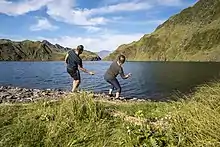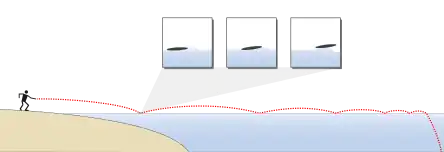Stone skipping
Stone skipping and stone skimming are considered related but distinct activities: both refer to the art of throwing a flat stone across the water in such a way (usually sidearm) that it bounces off the surface. The objective of "skipping" is to see how many times a stone can bounce before it sinks into the water; the objective of "skimming" is to see how far a bouncing stone can travel across the water before it sinks into the water. In Japan, the practice is referred to as Mizu Kiri, which loosely translates to "water cutting." In Mizu Kiri contests, both skimming and skipping principles, as well as a throw's overall aesthetic quality, are taken into account to determine the winners.

Championships and records
Coleman-McGhee founded the North American Stone Skipping Association (NASSA) in 1989 in Driftwood, Texas. NASSA-sanctioned world championships were held from 1989 through 1992 in Wimberley, Texas. The next official NASSA World Championship is expected to be held at Platja d'en Ros beach in Cadaqués, Catalonia, Spain. The two primary skip-counting championships in the USA are held in Mackinac Island, Michigan and Franklin, Pennsylvania in July and August, respectively. Other major contests include the Vermont Open and the Arkansas Championship, both in September.
A stone skimming championship takes place every year in Easdale, Scotland, where relative distance counts as opposed to the number of skips, as tends to be the case outside of the USA.[1] Since 1997, competitors from all over the world have taken part in the World Stone Skimming Championships (WSSC) in a disused water-filled quarry on Easdale Island using sea-worn Easdale slate of maximum 3" diameter.[2] Each participant gets three throws and the stone must bounce/skip at least twice to count (i.e. 3 water touches minimum).[3] The WSSC for 2020 were cancelled due to coronavirus concerns. The possibility of a competition happening on Sunday 26 September 2021 will be considered in due course.
Other domestic distance-based championships in the UK are currently the Welsh and British, but they were cancelled in 2020 for reasons including the COVID-19 pandemic. Japan holds competitions where both skimming and skipping principles, as well as a throw's overall aesthetic quality, are taken into account to determine the winners. At present, there is also a competition at Ermatingen in Switzerland and occasionally in the Netherlands (both skimming/distance-based).
The world record for the number of skips, according to the Guinness Book of Records, is 88, by Kurt "Mountain Man" Steiner (b. 1965). The cast was achieved on September 6, 2013, at Red Bridge in the Allegheny National Forest, Pennsylvania.[4] The previous record was 65 skips, by Max Steiner (no relation to K. Steiner), set at Riverfront Park, Franklin, Pennsylvania. Before him, the record was 51 skips, set by Russell Byars on July 19, 2007, skipping at the same location.[5] Kurt Steiner also held the world record between 2002 and 2007 with a throw of 40 skips, achieved in competition in Franklin, PA.
The Guinness World Record for the furthest distance skimmed using natural stone stands at 121.8m for men, established by Dougie Isaacs (Scotland), and 52.5m for women, thrown by Nina Luginbuhl (Switzerland). These records were made on the 28th of May 2018 at Abernant Lake, Llanwrtyd Wells, Powys, Wales.
Men's World Skimming Championship winners by year
2020 Championship cancelled due to the COVID-19 pandemic.
| 2019 | Peter Szep | Hungary |
| 2018 | Peter Szep | Hungary |
| 2017 | Keisuke Hashimoto | Japan |
| 2016 | Dougie Isaacs | Scotland |
| 2015 | Dougie Isaacs | Scotland |
| 2014 | Dougie Isaacs | Scotland |
| 2013 | Dougie Isaacs | Scotland |
| 2012 | Ron Long | Wales |
| 2011 | Dougie Isaacs | Scotland |
| 2010 | Dougie Isaacs | Scotland |
| 2009 | David Gee | England |
| 2008 | Eric Robertson | Scotland |
| 2007 | Dougie Isaacs | Scotland |
| 2006 | Tony Kynn | Australia |
| 2005 | Dougie Isaacs | Scotland |
| 2004 | Andrew McKinna | Scotland |
| 2003 | Ian Brown | Scotland |
| 2002 | Alastair Judkins | New Zealand |
| 2001 | Iain MacGregor | Australia |
| 2000 | Scott Finnie | Scotland |
| 1999 | Ian Shellcock | England |
| 1998 | Ian Shellcock | England |
| 1997 | Ian Sherriff | New Zealand |
| 1993 | David Rhys-Jones, Matthew Burnham, Jonathan Ford Joint winners |
Women's World Skimming Championship winners by year
2020 Championship cancelled due to the COVID-19 pandemic.
| 2019 | Christina Bowen-Bravery | UK |
| 2018 | Lucy Wood | England |
| 2017 | Nina Luginbuhl | Switzerland |
| 2016 | Lucy Wood | England |
| 2015 | Lucy Wood | England |
| 2014 | Helen Mannion | Scotland |
| 2013 | Lucy Wood | England |
| 2012 | Lucy Wood | England |
| 2011 | Joanne Giannandrea | Scotland |
| 2010 | Manuela Kniebusch | Germany |
| 2009 | Tessa Pirie | Scotland |
| 2008 | Jillian Hunter | Northern Ireland |
| 1997–Present (Honorable Mention) | CC Crosby | United States |
Scientific explanation

An early explanation of the physics of stone-skipping was provided by Lazzaro Spallanzani in the 18th century.[6][7][8] The stone generates lift in the same manner as a flying disc, by pushing water down as it moves across the water at an angle. Surface tension has very little to do with the physics of stone-skipping. The stone's rotation acts to stabilize it against the torque of lift being applied to the back.[6][7][8]
Research undertaken by a team led by French physicist Lydéric Bocquet discovered that an angle of about 20° between the stone and the water's surface is optimal to produce the highest amount of skips.[7][9][8] Bocquet and his colleagues were surprised to discover that changes in speed and rotation did not change this fact, as it allowed the stone to be in balance and to continue with a straight and uniform movement due to the gyroscopic effect.[9] Work by Hewitt, Balmforth and McElwaine has shown that if the horizontal speed can be maintained, skipping can continue indefinitely.[10] Earlier research reported by Bocquet calculated that the world record of 38 rebounds set by Coleman-McGhee, unchallenged for many years, required a speed of 12 m/s (25 mph), with a rotation of 14 revolutions per second.[9]
Names
- English: "skipping stones" or "skipping rocks" (North America); "lobsta cutting" (Cape Cod, North America); "stone skimming" or "ducks and drakes" (Britain); "skiting"[11] (Scotland) and "stone skiffing" (Ireland)[12]
- Bengali: "frog jumps" (Bengbaji); "kingfisher" (Machhranga)
- Bosnian/Croatian/Montenegrin/Serbian: "(to throw) little frogs" ([bacati] žabice)
- Bulgarian: "frogs" (жабки)
- Cantonese: "skipping (little) stones" (片石(仔) [pin sek (tzai)])
- Catalan: "making step-stone bridges" (fer passeres); "making furrows" (fer rigalets); "skipping stones" (llençar passanelles)
- Czech: "to make/throw froggies" (dělat (házet) žabky/žabičky – countrywide and generally intelligible); "to make ducks/drakes/ducklings" (dělat kačky/kačeny/kačery/kačenky/káčata/káčírky - in East Bohemia and parts of Moravia); "little fishes" (rybičky/rybky); "saucers" (mističky); "plates/dishes" (talíře); "wagtails" (podlisky/podlíšky/lyšky); "divers" (potápky); "pot-lids" (pokličky/pukličky); "flaps" (plisky/plesky); "plops" (žbluňky); "darts" (šipky); "bubbles" (bubliny); "Jews" (židy); "figures" (páni/panáky); "gammers"/"wagtails" (babky); "dolls"/"girls"/"dragonflies" (panenky); "to ferry Virgin Mary" (převážet panenku Mariu)[13]
- Danish: "slipping" (smut or at smutte); "to make slips" (at slå smut)
- Dutch: "ketsen" (bouncing)
- Estonian: "throwing a burbot" (lutsu viskama)
- Finnish: "throwing bread/a sandwich" (heittää leipiä/voileipiä)
- French: "making ricochets" (faire des ricochets)
- Greek: "little frogs" (βατραχάκια)[14]
- Hungarian: "making it to waddle", lit. "making it walk like a duck" (kacsáztatás)
- Italian: rimbalzello
- Japanese: "cutting water" (「水切り」[mizu kiri])
- Korean: mulsujebi (물수제비), meaning water (Korean: 물; RR: mul) and Korean soup sujebi.
- Lithuanian: "making frogs" (daryti varlytes)
- Macedonian: "frogs" (жабчиња)
- Mandarin: da shui piao (打水漂)
- Marathi: bhakrya kadhne
- Mongolian: "making the rabbit leap" (tuulai kharailgakh); "making the dog lick" (nokhoi doloolgokh)
- Nigerian: "the way a dragonfly skips across the water" (lami lami)
- Norwegian: "fish bounce" (fiskesprett)
- Polish: "letting the ducks out" (puszczanie kaczek)
- Portuguese "little fish" (peixinho); "little seashells" (conchinhas)
- Russian: "frogs" (лягушки [Lyagushki])
- Spanish: "making white-caps" (hacer cabrillas); "making little frogs" (hacer ranitas); making ducklings (hacer patitos)
- Swedish: "throwing a sandwich" (kasta smörgås or kasta macka)
- Telugu: "frog jumps" (kappa gantulu)
- Turkish: "skimming stone" (taş sektirme)
- Ukrainian: "letting the frogs out" (zapuskaty zhabky)
- Farsi/Persian: سوری زدن
- Vietnamese: "ricochet" (ném thia lia); "tossing stone" (liếc đá)
See also
- Animal locomotion on the water surface
- Bouncing bomb
- Ricochet
- Rock balancing (another hobby or pastime using stones)
- Skip bombing
References
- "BBC NEWS - UK - Scotland - Scots dominate in stone skimming". news.bbc.co.uk.
- "World Stone Skimming Championships 2007". www.scotlandontv.tv. Archived from the original on 2008-10-23.
- "World Stone Skimming Championships, Easdale Island". www.stoneskimming.com. Archived from the original on 2017-12-13.
- "Most skips of a skimming stone".
- Silver, Jonathan D. (2007-09-30). "A stone's throw and then some to a Guinness record". Pittsburgh Post-Gazette.
- SurferToday.com, Editor at. "The science and art of stone skipping". Surfertoday. Retrieved 2020-09-25.CS1 maint: extra text: authors list (link)
- Pascal, Molly. "Perspective | Kerplunks, pitty-pats and skronkers: The world of competitive rock-skipping". Washington Post. ISSN 0190-8286. Retrieved 2020-09-25.
- vdevlin@missoulian.com, VINCE DEVLIN. "Montana record a stone's throw away at Polson rock-skipping contest". missoulian.com. Retrieved 2020-09-25.
- Clanet C, Hersen F, Bocquet L (January 2004). "Secrets of successful stone-skipping". Nature. 427 (6969): 29. doi:10.1038/427029a. PMID 14702075.
- I. J. Hewitt; N. J. Balmforth & J. N. McElwaine (2011). "Continual Skipping on Water". J. Fluid Mech. 669: 328–353. doi:10.1017/S0022112010005057.
- "Scots dominate in stone skimming" - BBC News, 25 September 2005
- The Secrets of Stone Skipping, Coleman-McGhee, 1996, ISBN 1-883856-01-9
- Český jazykový atlas 1 (Czech Language Atlas 1), Academia, Prague, 2004, pp. 110–113, (dělat) žabky
- "Archived copy". Archived from the original on 2013-08-03. Retrieved 2013-07-29.CS1 maint: archived copy as title (link)
Further reading
External links
| Wikimedia Commons has media related to Stone skipping. |
| Look up ducks and drakes in Wiktionary, the free dictionary. |
- John Zehr's Patent, "Skipping stones and method of use thereof", US Patent 4553758
- John "Skippy" Kolar Skipumentary
- NASSA homepage
- Easdale's Stone Skimming World Championships
- World Championships on the BBC
- Wales Open Stone Skimming Championships
- Mackinac Island Stone Skipping & Gerplunking Club
- The Stone Skipping Hall of Fame (virtual)
- European Championships Stone Skimming
- Rock in River Festival, Pennsylvania Stone Skipping Championship
- European Championship Stone Skimming